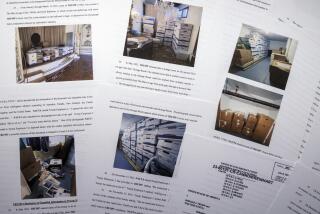Judge Urged Jones to Settle, Papers Show
- Share via
WASHINGTON — Before she dismissed Paula Corbin Jones’ sexual harassment suit against the president, the federal judge in the case did her best to promote a settlement, even offering to personally persuade the former Arkansas clerk that she “would have a difficult time winning her case,” according to court documents released Monday.
U.S. District Judge Susan Webber Wright is just one of several people, including some of her own lawyers, who have urged Jones to settle the four-year-old case--to no avail.
With a federal appeals court now considering whether the lawsuit should be reinstated and recent settlement talks apparently stalled, the documents show that Jones long has rejected legal advice in pressing her case.
Other portions of nearly 1,250 pages of new material reveal in fresh detail the effort one of President Clinton’s key supporters made to shield him from political damage.
A deposition from longtime Clinton aide Betsey Wright shows that during the 1992 presidential campaign she collected files about numerous rumors of Clinton’s marital infidelities and then passed them on to Webster L. Hubbell in January 1993, when Clinton became president and Hubbell was named the No. 3 official at the Justice Department.
Betsey Wright said she gave Hubbell the files on the advice of presidential confidant Bruce Lindsey, who is now deputy White House counsel.
She also recalled meeting with Clinton at her home in the late 1980s, when he was governor of Arkansas, and said he admitted there had been “points of great difficulty in his marriage” caused by his past sexual affairs.
The documents contain numerous minutes from closed-door sessions the judge held with the lawyers.
The clerk’s minutes from Oct. 29, 1997, show that Judge Wright was concerned that any trial could become a circus if the past sexual histories of Clinton and Jones were aired publicly.
“Court advises that parties should attempt to settle this matter, and instructs that it will not allow parties to bring numerous witnesses to trial testifying about sexual activity of both sides and will limit the number of witnesses and time to be spent on this issue,” the judge said, according to the minutes.
On Jan 6, Judge Wright again addressed the divisiveness between the two camps. “Court states that parties have been trying to put each other in bad light by things they are doing,” the minutes state. “And it is likely to be harmful more so to [Jones] than to president, and this activity will make it more difficult to find a fair jury.”
On Jan. 12, five days before Clinton was deposed in the case, the judge renewed her call for a settlement and argued that if the case were to go to trial, “everyone loses,” including other women allegedly involved with Clinton who would be harmed by trial testimony.
But Robert S. Bennett, Clinton’s personal lawyer, “states this case is not going to settle and he is going to advise Clinton not to settle case.”
Jones’ lawyers said they had “never” discussed a settlement with her but encouraged the judge to do so.
Judge Wright then said she “would like to talk to [Jones] and tell her that she should accept a reasonable offer; that she will have a difficult time winning her case.”
Bennett responded that he did “not believe the court should talk with Jones.” When the judge said she would talk to Jones only if lawyers from both sides were there, Bennett said he did “not want to be present in such a meeting.”
There was no indication from the material that the judge ever talked to Jones.
Betsey Wright, in her deposition, described a meeting with Clinton in the late 1980s in which they discussed whether he should run for president.
They were concerned that the negative fallout from Gary Hart’s failed bid for the White House, prompted by his own sexual affair, had created an “environment” where the media would also dig through Clinton’s past. Clinton was concerned about what that would mean for his wife, Hillary, and their daughter, Chelsea.
“Mr. Clinton did acknowledge to me points of great difficulty in his marriage,” Wright said.
She was asked whether she took that to mean he had engaged in extramarital sexual relations.
“I did,” she answered.
Later, she added: “I knew that Bill Clinton had had--had engaged in marital infidelity. [And] he knew that I knew that.”
On the matter of turning materials over to Hubbell, Betsey Wright said there were files prepared by an investigator hired by the Clinton camp to knock down stories that placed him in a bad light when he was running for president in 1992.
More to Read
Sign up for Essential California
The most important California stories and recommendations in your inbox every morning.
You may occasionally receive promotional content from the Los Angeles Times.











